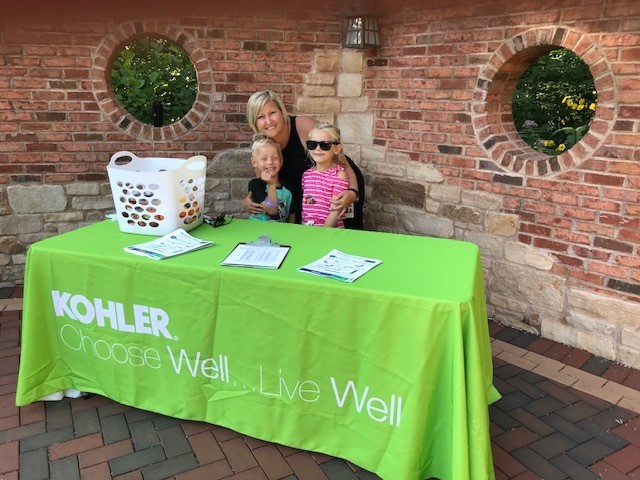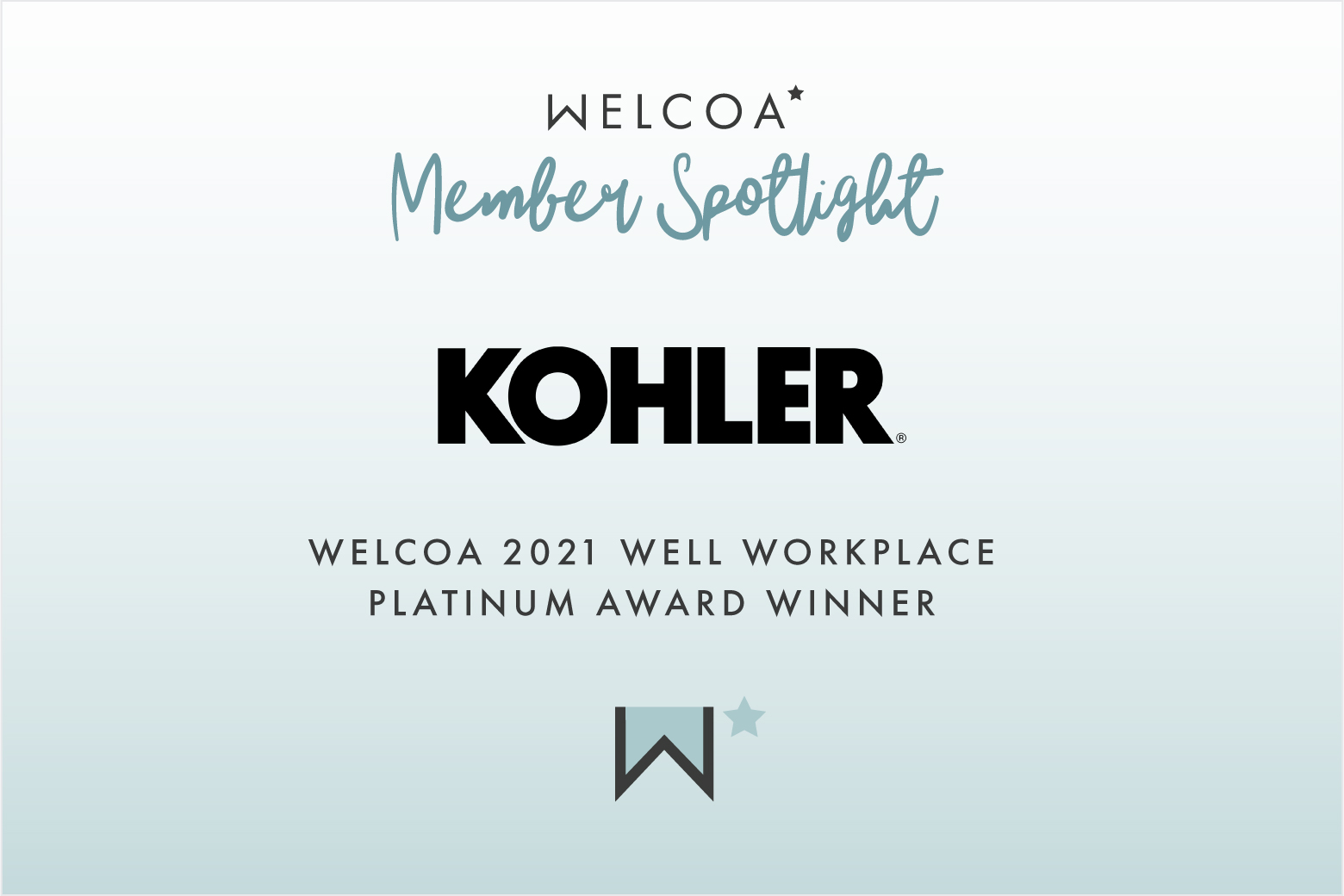It should come as no surprise that the spaces we occupy every day have a huge impact on our overall wellness. The Environmental Protection Agency and Vancouver Coastal Health report that Americans and Canadians spend about 90% of their time indoors. But what about the time we spend outdoors?
Your Welcoa membership has expired.
Good Deeds Lead to Well-Being: How Kohler Co. Supports the Health and Wellness of Associates and Communities with a Heart for Social Impact

Based in Wisconsin, Kohler Co. is a global leader in the design and manufacture of kitchen and bath products, engines, generators, and clean energy solutions. The company also offers premium lifestyle experiences through a network of golf courses, resorts, and spas. Overall, the company employs more than 35,000 associates across six continents.
At Kohler, well-being starts with good deeds.
The company has made a strong commitment to social impact, specifically supporting safe water and sanitation for all people. With a culture already wired for giving back and valuing sustainability, it’s no surprise that the company’s well-being program incorporates socially responsible behaviors at its core.
“We have all these amazing impact programs already in motion, so it was an obvious goal for us to interweave our well-being efforts into them,” said Erin Schad, senior benefits analyst for well-being at Kohler. “Social impact is a critical part of the well-being journey for our associates.”
This is even more noteworthy given the primary industries within which Kohler operates.
“As a manufacturer, we understand the importance of improving our environmental footprint,” Schad said. “In fact, Kohler has a goal to have a net-zero footprint by 2035. We also understand that what we do today impacts our families and communities in the future.”
As a result of the company’s focus on social impact, its well-being programming extends far beyond the four walls of the company, stretching into communities across the globe.
“We are focused on providing a gracious experience for our associates, their families, and the communities where we all live and work,” Schad said. “In the U.S. alone, we are part of the fabric of many communities, ranging from Union City, Tennessee to Portland, Oregon, to Spartanburg, South Carolina.”
Choosing Initiatives that Support the Whole Employee
WELCOA Benchmark 5: Choosing Initiatives that Support the Whole Employee is a cornerstone of the Kohler program. Schad and team work hard to create well-being programs that are comprehensive and address the whole person.“Going to a gym, giving back to the planet, engaging in self-improvement through continuing education, all of these facets are important at Kohler,” Schad said. “We don’t place well-being in a single bucket. We also have high empathy for associates who don’t fit the traditional well-being mold. We will never make them feel uncomfortable because of their unique well-being journey. Everyone’s path is their own. So, we not only focus on the whole associate, but also the entire array of associate needs.”
In order to achieve a truly holistic offering, Kohler’s well-being team realized it needed to re-think some basic principles of traditional wellness programs, starting with how it viewed engagement as a success metric.
“Engagement is important, but it’s not everything,” Schad said. “We provide options for all scenarios. Sometimes that results in low participation for specific initiatives but, across the board, we find that we are able to get more people active in the program by offering a larger variety of support.”
Another important consideration when designing holistic programming is what Schad describes as a “diverse population.” The company employs a large essential workforce, made up mostly of manufacturing associates. It also has a substantial administrative workforce and hospitality staff that supports golf courses, resorts, and spas. In addition to a diverse workforce, the company has a wide range of worksites across the U.S. These sites include rural and remote locales, as well as metropolitan venues.
The core, two-person well-being team can’t possibly extend across the entire U.S. footprint to make well-being meaningful for all associates. Not without help. So, they have formed two wellness committees to help spread the word. One committee is made up of HR representatives across the U.S. who have a passion for well-being. The second committee is built from associates at Kohler’s main campus in Wisconsin. Both act as “boots on the ground” to carry well-being to every corner of the country. They leverage prebuilt toolkits, communications, and events to localize and personalize the well-being experience at each worksite and in each community.
A Multi-Level Approach to Well-Being
The Kohler program operates on two different levels. On the one hand, the company offers an incentive-driven program that spans multiple facets of well-being (physical, mental and emotional, meaning and purpose, and financial). Kohler families can earn monetary credits for completing well-being activities to help defray expenses.The second level is the day-to-day focus on well-being that helps build a strong well-being culture. The team constructs a robust annual well-being calendar and executes events and promotions monthly to keep well-being top of mind. These events range from blood drives to family events such as a recent Bookworm Gardens event in nearby Sheboygan that included a scavenger hunt and kid-friendly activities for associates and their families.

“The annual calendar is important because it helps us maintain our culture of well-being, and it creates opportunities for us to help associates discover the options that are available to support them in their well-being journeys,” Schad said. “We invest a significant amount of time each year to ensure our annual calendar is high impact and filling specific needs our associates have expressed.”
Pivoting During the Pandemic
During the pandemic, Kohler implemented a mental health check-in survey – the first in its history – with several thousands of associates completing it. The results were not surprising: some associates were struggling, just like the rest of the country.“Many of our associates wanted to be seen and appreciated,” Schad said. “Those who were feeling these things were excelling and thriving. Those who were lacking in these areas were stressed. All organizations are trying to combat feelings of burnout and stress. Based on the survey results, we doubled down on how we were approaching mental health to make sure our associates received adequate support in this area, including training and additional content from organizations such as the National Council for Mental Wellbeing and Mental Health America. We made mental health part of our daily conversations.”
The pandemic created the need for the company’s well-being program to shift to a virtual-first model. Among the creative ways that Kohler adjusted for this reality included a new assignment for its health coaches.
“We have a team of dedicated health coaches through an external vendor, and we’ve trained these coaches on our benefits, resources, culture, etc.,” Schad explained. “They know our associates and what makes us tick. Early on in the pandemic, we saw that our associates were less likely to engage in health coaching calls, so we repurposed our approach to create new content weekly in the form of virtual coffee talks, covering topics from stretching to short workouts to mindfulness.”
Kohler has seen an average of 30 to 100 associates participating in these 30-minute sessions. To date, 1,387 associates have attended coffee talks.
As COVID-19 sent associates home to work – for those who could – and closed traditional options for childcare, many people were scrambling to figure out new solutions for their kids. Kohler’s well-being team partnered with the local YMCA to create a special daycare offering for associates at the company’s main campus. In addition to a discounted rate through the YMCA, Kohler also subsidized a portion of daycare costs for associates.
Also in response to the pandemic, Kohler established a care coordination program to offer assistance to associates who were caregiving for family members. Associates received help coordinating everyday needs such as yard work and grocery shopping, creating schedules for meetings and appointments, and researching available healthcare and community resources. This service was so well received by associates that the Kohler team has decided to offer it as an ongoing benefit.
Despite its impressive responsiveness to evolving associate needs during a very challenging time, the Kohler team also used the pandemic as a catalyst for long-term change as well.
“We used the pandemic as an opportunity to change our strategy,” Schad said. “We spent a lot of time determining where we wanted our program to go from here. Part of that resulted in a decision to kick off our first global strategy this fall, so we will take what we’ve learned in the U.S. and carry it across all six continents where we have a presence.”
Working with WELCOA – Experience and Insight “On Demand”
“When you have a small team of people, sometimes you can doubt yourself,” Schad said. “As we were whiteboarding our most recent strategy, the first thought I had was, ‘Let’s talk to WELCOA.’ They are such a value-add when it comes to shared experience and networking. WELCOA can connect you with other organizations that are, or have been, in a similar position. We appreciate their expertise and relevant peer experience, and know they are just a phone call or email away.”Schad and team also take advantage of WELCOA’s calendar of educational opportunities and vendor spotlights that occur throughout the year.
“We need to continue to think better, not best. It’s about improvement, not absolutes,” she said. “We get a lot out of the training and educational sessions. WELCOA highlights innovative vendors in the space, and since we are always looking for ways to expand and improve our program, that is helpful as well.”
As a parting thought for wellness pros, Schad points back to the big picture and encourages connection.
“It’s easy to get lost in the day-to-day of the job,” she said. “Staying active by attending presentations, making connections, or touching base with other well-being professionals, it always brings me back to why I do what I do. It reignites a passion in me that I try to bring back to our associates.”
Want to learn more about Kohler’s well-being strategy? Have a best practice or winning approach you’d like to share with the WELCOA team?




